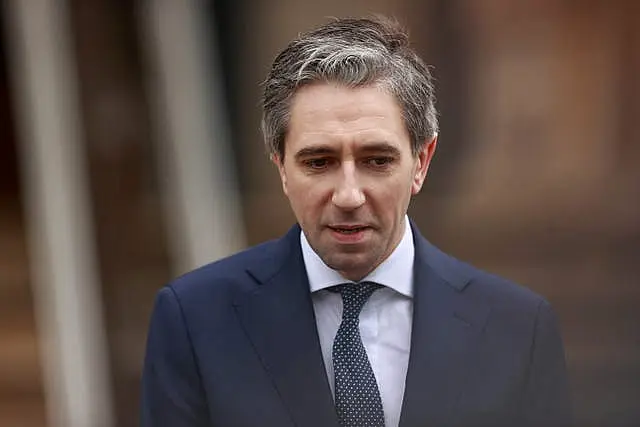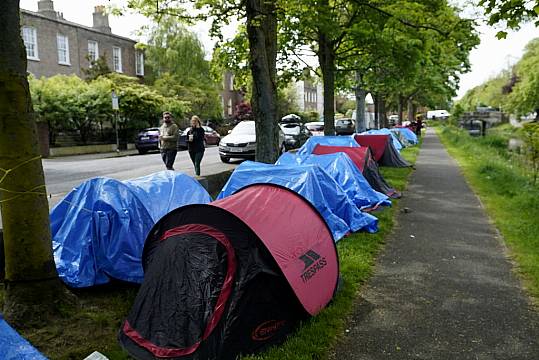Migrants in the UK are being transported to Ireland under false promises of work by “people traffickers”, the Dáil has been told.
Independent TD Michael McNamara said he has been in contact with a man from the Indian subcontinent who entered the UK on a visa approved by the UK government which allowed him to work for 10 hours per week.
He said the man went to an agency in London who told him they could secure full employment in Ireland for him, as well as arrange his travel and work permits.
“They took £1,500 from him and retained his passport so that he would pay an additional £1,000 when he started work.
“They arranged his travelling to Liverpool and from there a ferry to Belfast from where he travelled down to Dublin.”
Mr McNamara said the man was given the Eircode and postal address of his new employer, but added: “When he turned up there, it was the International Protection Office (IPO) in Dublin.
“He obviously didn’t know he was being sent to the IPO.”
Addressing Taoiseach Simon Harris during Leaders’ Questions, Mr McNamara told the Dáil that the man was one of five people travelling in a similar way, organised by the same agents.
“He knows of 30 more people sent to Ireland by the agency in the same way”.
Mr McNamara said the man is now attempting to get out of the asylum system in Ireland and return to the UK, but he does not have his passport.
“It’s very clear that vulnerable people in a precarious position are being horribly exploited by bad actors, but it’s equally clear that our State is being exploited by those bad actors.
“And while the Punch and Judy show that your Government is engaging in with UK authorities is all well and good, I want to know, Taoiseach, what you can do and hope there is of international cooperation to resolve this?”

Mr McNamara said the existence of the agency involved in this case suggests that there are many others operating.
He also questioned the Taoiseach about when a review into the circumstances behind the Department of Justice's failure to put an asylum seeker with a UK conviction on the Irish sex offenders’ register was ordered, given that a High Court judgment relating to the matter was handed out on March 22nd.
Mr Harris said it was his understanding that Minister for Justice Helen McEntee sought the review last week.
Mr McNamara had said he hoped it was not “rustled up” in response to press queries, adding: “That would be entirely unacceptable.”
In a subsequent session in the Dáil, the Labour Party leader raised the migrant encampment along the Grand Canal in Dublin, which has grown to more than 100 tents.
The encampment emerged shortly after more than 200 asylum seekers were cleared from a similar makeshift camp at the nearby IPO on Mount Street.

Labour leader Ivana Bacik told the Taoiseach: “It is inhumane, it is unsustainable, and your Government has failed to offer a coherent plan that is needed longer term to provide accommodation.”
Speaking during a debate on the week’s order of business, she added that a notice had gone up on Mount Street advising those who are in tented accommodation that they can avail of an increased daily expense allowance if they leave their tents.
“It is clearly a desperate stopgap attempt to move people on without any reality in the provision of longer-term accommodation.”
Mr Harris said the Mount Street operation had a “very positive impact” and averted a “public health near-emergency”.
He said: “I continue to believe that it was the right action to take.
“I became Taoiseach four weeks ago, I took charge of this situation.
“There had been, in my view, a tacit acceptance by many State agencies that the situation on Mount Street could just continue and was just the new norm. That was not right.”
He added: “We will deal with the Grand Canal. Action will be taken.”

Elsewhere, Tánaiste Micheál Martin rejected accusations that the Government did not have a plan for asylum-seeker accommodation.
Speaking to the media at a 1916 commemoration at Arbour Hill cemetery, he added: “Those tents are not acceptable for the locality, for the residents, for the migrants, because the facilities are not there, and it’s dangerous.”
“We are determined to deal with that issue and will, and on a broader front, create more accommodation but also to deal with the issues that is leading to so much migration, not just coming into Europe but coming into Ireland as well.
“We are at number we have never experienced before, and the pressures are very severe. We have got to respond to those, and we will.”







